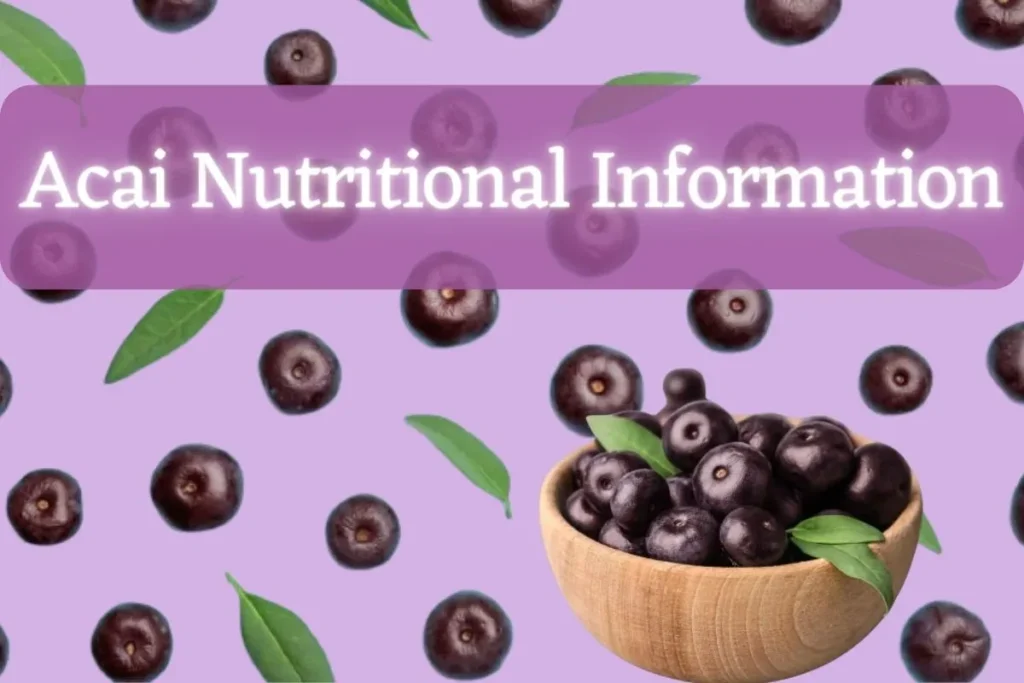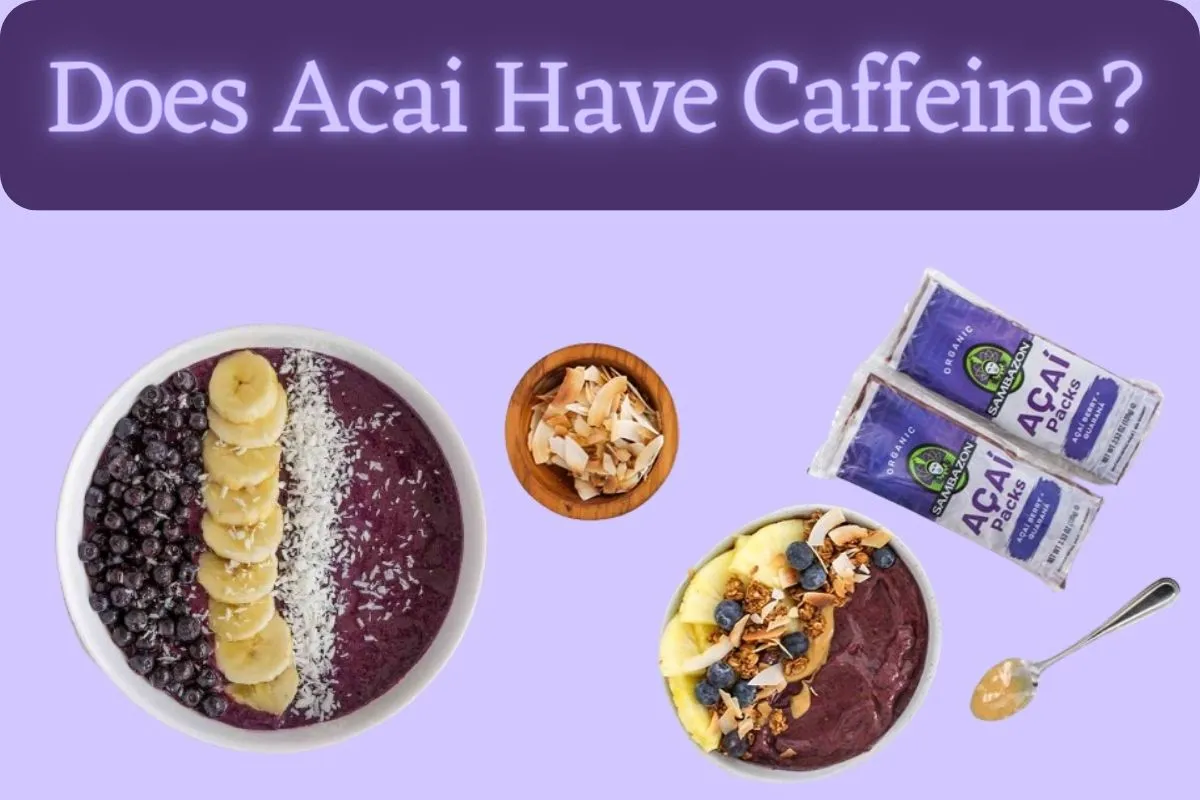Acai berries, hailing from the lush Amazonian rainforests, have garnered a reputation as a nutritional powerhouse. They’re packed with antioxidants, healthy fats, and a good dose of fiber. These small, dark purple berries contribute to a healthy diet, but when it comes to the question of whether acai has caffeine, the answer might be a little more nuanced.
Let’s delve deeper into this and explore Does Acai Have Caffeine?
Importance of Knowing About Acai
Acai products, particularly smoothies, juices, and acai bowls, have gained immense popularity globally as healthy and refreshing snacks or meal replacements.
Acai berries offer a plethora of health benefits due to their rich nutritional profile. They are known for being an antioxidant powerhouse, aiding in cholesterol management, potentially having anti-cancer effects, supporting brain health, and boosting energy levels without the need for caffeine. These benefits are attributed to the berries’ high content of vitamins, minerals, fiber, and healthy fats.
While the raw acai berry is caffeine-free, processed supplements and beverages can contain added caffeine or ingredients like theobromine. Factors like the processing methods, added ingredients in commercial acai products, and individual sensitivity can significantly influence the overall caffeine content.
People who are sensitive to stimulants, those with anxiety disorders, pregnant or breastfeeding women, and individuals on certain medications might need to be mindful of their acai consumption due to the potential effects of theobromine.
Does Acai Have Caffeine?
No, acai berries in their natural, unprocessed state are caffeine-free, the situation becomes a bit more complex when discussing commercial products.
Acai berries contain a compound called theobromine, which is a mild stimulant similar to caffeine. While the effects are typically less pronounced, some individuals might still experience a subtle energy boost.
Additionally, many commercial acai products like juices or powders could contain other ingredients that do have caffeine, such as guarana or green tea extract. It’s important to remember that individual sensitivity to theobromine varies as well.
Therefore, while pure acai berry is caffeine-free, it’s always crucial to carefully check the labels of acai products for added ingredients. If you’re sensitive to stimulants, it’s best to monitor your acai consumption and observe how it impacts you.
Acai Variants and their Caffeine Content
Acai products come in various forms, each with its own potential caffeine content depending on the ingredients used in their preparation. Here’s are some common acai products and their caffeine content:
Pure Acai Berry Products (Fresh, Frozen, or Powder):
These are the basic forms of acai, including fresh berries (though rare outside of where they’re grown), frozen pulp, and powdered acai berry. As the acai berry itself does not naturally contain caffeine, these products are typically caffeine-free unless they are blended or mixed with ingredients that contain caffeine.
Acai Bowls:
A popular way to enjoy acai, these bowls are made by blending acai pulp with various fruits, and sometimes supplements or additives, and then topping them with ingredients like granola, seeds, and nuts. The caffeine content in acai bowls depends on the added ingredients. Some may include chocolate, guarana, or green tea extract, all of which contain caffeine. It’s crucial to inquire about the specific ingredients if the caffeine content is a concern for you.
Acai Juices and Smoothies:
Similar to acai bowls, the caffeine content in acai juices and smoothies hinges on the other ingredients mixed with the acai. Pure acai juice is naturally caffeine-free, but some products on the market may add ingredients like green coffee extract or guarana to boost energy levels, thus adding caffeine to the mix.
Acai Supplements:
Supplements come in various forms, including capsules, powders, and tablets. While the acai component does not contain caffeine, some manufacturers may add caffeine or other energizing substances to their formulas. It’s important to read the supplement label carefully to understand its caffeine content.
Acai Tea:
Interestingly, acai tea is mentioned as a caffeine-free option. However, it’s worth noting that the base tea used with acai flavoring could potentially contain caffeine unless specifically stated to be herbal or decaffeinated. Thus, acai teas can vary widely in their caffeine content based on the type of tea used as the base.
Acai Energy Drinks:
Some energy drinks incorporate acai berry for its antioxidant benefits but also include caffeine, either from traditional sources like tea and coffee extracts or through added pure caffeine. These products are designed to provide an energy boost and will contain varying levels of caffeine depending on their formulation.
Acai Nutritional Information

A 100-gram serving of acai berries offers a moderate energy boost of 75 calories. It contains 6.3 grams of total fat, with most being healthy polyunsaturated and monounsaturated fats and only a small portion (0.9 grams) from saturated fat. Acai is cholesterol-free and very low in sodium (5mg).
In terms of carbohydrates, a serving provides 5.4 grams, of which 3.8 grams are beneficial dietary fiber. Naturally occurring sugars make up 1.1 grams of the carbohydrate content. Acai berries provide 1.1 grams of protein and a small but present amount of calcium, iron, and potassium. Importantly, Does Acai Have Caffeine? Yes, acai berries are caffeine-free.
| Nutrition Facts | Amount Per Serving |
| Serving Size | 100g |
| Calories | 75 kcal |
| Total Fat | 6.3g (8% DV) |
| Saturated Fat | 0.9g (4% DV) |
| Trans Fat | 0g |
| Polyunsaturated Fat | 0.8g |
| Monounsaturated Fat | 3.9g |
| Cholesterol | 0mg (0% DV) |
| Sodium | 5mg (0% DV) |
| Total Carbohydrates | 5.4g (2% DV) |
| Dietary Fiber | 3.8g (14% DV) |
| Sugars | 1.1g |
| Protein | 1.1g |
| Vitamin D | 0mcg (0% DV) |
| Calcium | 12mg (1% DV) |
| Iron | 0.4mg (2% DV) |
| Potassium | 235.2mg (5% DV) |
| Caffeine | 0mg |
Alternatives to Acai and their Caffeine Content
Here are a few acai alternatives with delectable flavors and comparable health benefits:
Blueberries:
These sweet and versatile berries are a true superfood, bursting with anthocyanins (the same type of potent antioxidants found in acai). They also provide a healthy dose of vitamins and fiber and are naturally caffeine-free.
Pomegranate:
The juicy arils of the pomegranate offer a unique sweet-tart flavor and a treasure trove of antioxidants, vitamins, and fiber. Enjoy them fresh, or as juice, for a caffeine-free nutrient boost.
Blackberries:
These dark, juicy berries are loaded with antioxidants, along with a good amount of fiber and vitamin C. They’re a delicious snack on their own or a fantastic addition to smoothies and yogurt. No caffeine worries here!
Maqui Berry:
Hailing from Chile, this superfruit boasts one of the highest antioxidant concentrations of any known berry – even higher than acai! They offer a sweet, slightly tart flavor profile and are typically found in powder or juice form. Naturally caffeine-free.
Goji Berries:
These chewy, little red berries have been used in traditional Chinese medicine for centuries. They provide a concentrated source of antioxidants, vitamins, and minerals, all with zero caffeine.
Pitaya (Dragon fruit):
This visually striking tropical fruit with its vibrant pink skin and white, speckled flesh provides a refreshing source of fiber, vitamins, and minerals. It’s a fantastic option for those seeking a caffeine-free exotic boost.
Cacao Nibs:
Essentially the purest form of chocolate, cacao nibs deliver a powerful dose of flavonoid antioxidants and a subtly bitter, chocolatey flavor. They do contain theobromine, a mild stimulant similar to caffeine, making them suitable for those sensitive to caffeine, but worth noting if you’re highly sensitive to any stimulant effect.
Spirulina:
This blue-green algae is a remarkable source of complete protein, vitamins, minerals, and antioxidants. Its nutrient density makes it a popular addition to smoothies and a caffeine-free health boost.
Moringa Powder:
Created from the dried leaves of the fast-growing moringa tree, this earthy-tasting powder is packed with nutrients, including vitamins, minerals, and antioxidants. In addition, it boasts anti-inflammatory properties and is naturally caffeine-free.
Tart Cherry Juice:
This concentrated juice offers potent antioxidants and potential benefits of reducing inflammation and muscle soreness. It makes a delicious and caffeine-free alternative for supporting overall health and recovery.
| Alternative to Acai | Caffeine Content |
| Blueberries | Naturally caffeine-free |
| Pomegranate | Caffeine-free |
| Blackberries | Naturally caffeine-free |
| Maqui Berry | Naturally caffeine-free |
| Goji Berries | Zero caffeine |
| Pitaya (Dragon Fruit) | Caffeine-free |
| Cacao Nibs | Contain theobromine |
| Spirulina | Caffeine-free |
| Moringa Powder | Naturally caffeine-free |
| Tart Cherry Juice | Caffeine-free |
Conclusion
Does Acai Have Caffeine? No, Acai berries in their pure form are naturally caffeine-free. However, the presence of theobromine, a mild stimulant, means some individuals may experience a subtle energy increase from acai consumption. Moreover, many commercial acai products contain additional ingredients that could introduce caffeine into the mix.
Therefore, it’s crucial to always read labels carefully and opt for unsweetened, pure acai products whenever possible. If you’re sensitive to stimulants or looking to avoid caffeine, being mindful of acai product choices can ensure you enjoy its nutritional benefits without any unwanted side effects.
FAQs
Q1. What is acai and is it good for you?
Acai is a small, dark purple berry that grows on acai palm trees native to the rainforests of Central and South America. Acai has gained a superfood reputation due to its high antioxidant content, healthy fats, and fiber. Antioxidants help protect your cells from damage, and healthy fats are important for heart health.
Q2. Why is acai so expensive?
There are several reasons behind acai’s higher price tag. Firstly, acai berries are highly perishable and need to be processed quickly after harvest to avoid spoilage. Secondly, acai palms primarily grow in the Amazon rainforest, making the harvesting and transportation process logistically challenging.
Lastly, the global popularity of acai has driven demand higher, and the limited growth regions of the acai palm often struggle to keep up.
Q3. Is acai okay to eat everyday?
While acai is generally safe for most people, moderation is key, as with any food. Consuming acai daily could add a healthy boost to your diet, but consider portion size. Stick to a reasonable serving of pure acai or be mindful of added sugars and other ingredients when enjoying processed acai products.
Q4. Why is acai so popular?
Acai’s popularity stems from a combination of factors. Its high antioxidant content and healthy fats align with the growing focus on wellness and superfoods. Acai has also been heavily promoted as a health food with a range of potential benefits. Moreover, its unique berry-chocolate flavor profile lends itself to various dishes, from smoothie bowls to juices.
Q5. Who should not take acai?
While generally safe, some individuals might need to be cautious with acai. The presence of theobromine in acai might cause jitters in those particularly sensitive to stimulants. Also, if you have any specific health concerns or are on medications to ensure acai doesn’t interact negatively, consult your doctor before consuming acai.

Rossi Glover, the passionate Owner of Grand Lake Coffee, infuses every cup with her love for coffee and dedication to quality. With an extensive background in the art and science of coffee, Rossi is not just a connoisseur but a storyteller, sharing the intricate tales behind each brew.

